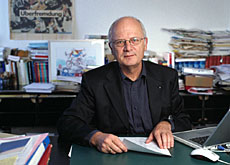
Swiss were seduced by “criminal Europe”

Images of a "criminal Europe" helped convince voters of the merits of the Schengen/Dublin accords, according to the head of the Europa Institute.
In an interview with swissinfo, Georg Kreis said both supporters and opponents of closer ties with the European Union tried to outdo each other with pictures of people in handcuffs.
In a nationwide vote on Sunday, 54.6 per cent of the electorate backed the Schengen/Dublin accords governing closer cooperation with the EU on security and asylum issues.
The treaties form part of a second set of bilateral treaties signed between Bern and Brussels last year.
Kreis said the “yes” vote – which was higher than some analysts had predicted – had shown that the political Right was divided and that supporters and opponents could not be separated along traditional party lines.
He also expressed confidence that the next vote in September – on whether to extend an existing accord with Brussels on the free movement of people to include the new EU member states – would also go the government’s way.
swissinfo: First of all, what’s your reaction to Sunday’s “yes” vote?
Georg Kreis: I’m very happy with the result, which is clearer than I had expected it to be. Common sense has spoken in Switzerland.
The outcome can to some extent be explained in economic terms, in particular the fact that the Swiss tourism industry [had pushed for a “yes” vote].
Another argument which obviously appealed to voters – and this is not something I particularly welcome – was that by signing up to Schengen we would be better placed to fight against “criminal Europe”. Supporters and opponents of Schengen tried to outdo each other with adverts and posters showing people in handcuffs.
In the end this probably helped those in favour of the accords to win the vote, but what it has also done is shore up the view that Europe is a dangerous place.
swissinfo: Switzerland’s major tourism regions in the German-speaking part of the country, as well as in Ticino, voted against Schengen. How do you explain this, given that the tourism industry had been campaigning for a “yes” vote?
G.K.: Well, the answer is that we have a situation similar to what happened with the “no” to joining the European Economic Area in 1992. Rural areas… or at least areas where a rural mentality prevails, were more sceptical. Urban areas were more in favour of joining Schengen.
I don’t think the Swiss think very territorially. In other words, people living in towns and cities which are not really tourist destinations can also be persuaded to support the accords because they see the advantages for the tourism industry as a whole.
swissinfo: Sunday’s vote on Schengen was also simultaneously a vote on the parallel Dublin accord on asylum cooperation – but the latter didn’t seem to attract as much media interest…
G.K.: The Dublin accord [- an agreement allowing member countries to turn away asylum seekers who have already had their applications rejected in another signatory country -] was indeed very much in the background during the campaign.
The focus of the debate was much more on the question of how Switzerland’s borders would be protected in the future. If the asylum situation had been much more dramatic I am sure that the Dublin accord would have featured much more prominently – and in a negative way.
But all in all the battle lines were drawn very firmly around Schengen and not around Dublin.
swissinfo: There is a clear difference of opinion between two traditional allies: the business world was in favour of Schengen/Dublin and supports the vote in September on the free movement of people. But rightwing parties are firmly opposed to both…
G.K.: This weekend has shown that the picture is far more complex than many people think. The traditional politics of Left against Right are not playing out as expected.
The decisive factor is that the more reform-minded side of the political Right has the upper hand… and I am more confident about a “yes” vote in September than the media seems to be. Of course I don’t mean that the outcome is already in the bag, but I reckon the chances of winning support for the accord on the free movement of people are good.
swissinfo: The campaign ahead of the Schengen/Dublin vote played on people’s fears. Do you expect this to continue in the run-up to September?
G.K.: That’s possible, but I think that opponents of closer ties with the EU have already gone over the same old ground in a very over the top way. So I simply don’t know how they can step up their campaign of scaremongering and lies… any more than they have already done.
swissinfo-interview: Andreas Keiser
Georg Kreis was born in Basel in 1943.
He studied at Basel University and gained a PhD in contemporary history.
He is director of the Europa Institute at Basel University.
He was appointed president of the Federal Commission against Racism in 1995.

In compliance with the JTI standards
More: SWI swissinfo.ch certified by the Journalism Trust Initiative

























You can find an overview of ongoing debates with our journalists here . Please join us!
If you want to start a conversation about a topic raised in this article or want to report factual errors, email us at english@swissinfo.ch.